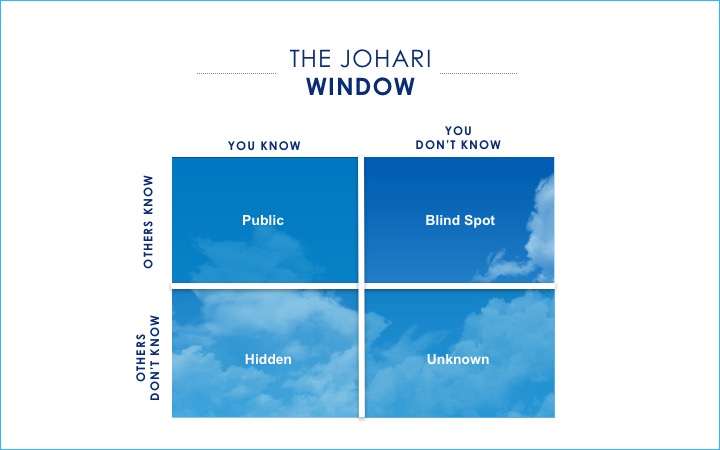Do you know which of your behaviors most get in your way? Do you get help from your trusted friends and colleagues in your personal and professional development? The Johari Window is a model that illustrates, in a very simple manner, how you can leverage the power of others to accelerate your own growth and development. Let’s see how it can help you.
The Johari Window
The Johari window (image above) was created in 1955 by two American psychologists, Joseph Luft (1916–2014) and Harrington Ingham (1914–1995), to help people better understand their relationship with self and others. It’s a really useful framework to reflect on how you see yourself vs. how others see you. Let’s take a look at its four quadrants:
(1) ‘Public’ / ‘Open’: things about you that both you and others are aware of.
(2) ‘Hidden’ / ‘Façade’: things about you that you are aware of, but others are not.
(3) ‘Blind Spot’: information about you that you are not aware of, but others are.
(4) ‘Unknown’: information about you that neither you nor others are aware of.
Finding Areas for Improvement
Are you familiar with the concept of a blind spot when driving? These are certain places around our vehicle that are not visible to us in our mirrors at a given moment in time. Awareness of blind spots is key to being a better driver because we will look more intentionally to see what’s there (e.g., before switching lanes).
Like the cars, we as humans also have blind spots regarding our own behaviors. Many of us operate, however, without wanting to “see what’s there.”
To accelerate your personal development, it will serve you to proactively identify those self-limiting behaviors that are in your blind spot.
To identify these self-limiting behaviors is actually quite simple, but not always easy. Start by soliciting feedback from individuals whom you trust and will be honest with you. These should be people who care about you and your growth and who see you in action on a regular basis and hence have a valid perspective on how you “show up.”
Here are a couple of ways to approach these individuals (your ‘support team’):
- Ask an open-ended question such as “I’m curious. If you were to encourage me to shift one thing about my behavior so that I could be more successful, what would that be?” Give people time to consider this instead of expecting an on-the-spot response.
- Show them a list of common self-limiting behaviors (here’s a list from my prior blog) and ask them to highlight any that they see in you.
In seeking out this information, you are effectively “expanding” your Public quadrant while shrinking the size of your Blind Spot quadrant (see image below). This increases your awareness of how you are perceived by others.

Working on Your Areas for Improvement
The Johari Window framework not only helps you to identify behaviors to work on, as described above. It also illustrates a simple approach to working on those behaviors.
You can further accelerate your personal development by disclosing what you are working on with trusted individuals that can provide you with feedback on how you are doing.
For example, let’s say you’ve learned of a blind spot around how much “space” you take up in meetings. You decide you want to work on speaking less and listening more. But don’t stop there. Tell a few close colleagues about this, and ask them to observe you and give you feedback. Their help will make it more likely that you’ll shift your behavior…and faster.
In this instance, you are effectively expanding your Public quadrant and shrinking your Hidden quadrant. (See image below.)

Use Your Public Quadrant to Support Your Personal and Professional Growth
The size of the Public quadrant in your Johari Window is owned by you. As we just discovered:
- You can expand the Public quadrant horizontally, reducing your Blind Spot quadrant, by soliciting feedback from people you trust.
- You can expand your Public quadrant vertically, reducing your Hidden quadrant, by disclosing your development areas to trusted individuals.
It’s your career. It’s your life. Be discerning on when/how to leverage the power of others to accelerate your own growth and development.
